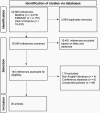Comparative analysis of state-level policy responses in global health governance: A scoping review using COVID-19 as a case
- PMID: 39509448
- PMCID: PMC11542793
- DOI: 10.1371/journal.pone.0313430
Comparative analysis of state-level policy responses in global health governance: A scoping review using COVID-19 as a case
Abstract
Background: States are key actors in global health governance, particularly in the prevention and control of infectious diseases. The emergence and re-emergence of infectious diseases in recent decades pose profound challenges to global health security. As the first coronavirus pandemic, the COVID-19 caused significant damage worldwide, but responses and outcomes varied greatly among states. Using COVID-19 as an example, this study aims to compare the policies and measures implemented by different states during the COVID-19 pandemic and to synthesize experiences to strengthen global health governance for future infectious disease crises.
Methods: We used Arksey and O'Malley's five-stage scoping review framework and PRISMA methodology was used for literature search and decision on relevant studies. English databases were searched using combinations of keywords and articles examining COVID-19 prevention and control policies in representative countries were included. A comparative analysis across these four states (United States, Sweden, India, and Nigeria) was then conducted to analyse the differences, rationale, and challenges of the approaches taken by these states.
Results: A total of 36 studies were included in the analysis. The management of the COVID-19 by states is divided into two main categories: domestic governance and international governance. Domestically, the United States and India have taken more measures, yet notable disparities in infection source control, transmission interruption, vulnerable population protection, collaborative governance, and so on were observed among all four states. Globally, the United States and Sweden were more proactive in international governance, and all four states have variations in their adherence to global regulations, information sharing, resource distribution, and cooperative engagement.
Conclusions: Significant disparities occurred during the response to early COVID-19 in four states, which may be due to differences in politics, economy, and culture. To prevent and mitigate the impact of infectious diseases, states should, in future, prioritize solidarity and cooperation, and improve governance domestically and internationally based on national contexts and global health principles.
Copyright: © 2024 Tang et al. This is an open access article distributed under the terms of the Creative Commons Attribution License, which permits unrestricted use, distribution, and reproduction in any medium, provided the original author and source are credited.
Conflict of interest statement
The authors have declared that no competing interests exist.
Figures
References
-
- Lu X, Fang P. Global Health Governance. Beijing: People’s Medical Publishing House; 2016.
-
- Dodgson R, Lee K, Drager N. Global Health Governance: A CONCEPTUAL REVIEW. London; 2002.
-
- WHO. WHO Coronavirus (COVID-19) Dashboard. [Cited 2024-02-05]. Available from: https://data.who.int/dashboards/covid19/cases.
Publication types
MeSH terms
LinkOut - more resources
Full Text Sources
Medical
Research Materials



